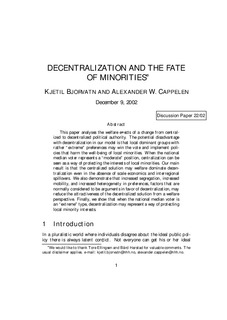Decentralization and the fate of minorities
Working paper

View/
Date
2002-12Metadata
Show full item recordCollections
- Discussion papers (SAM) [658]
Abstract
This paper analyses the welfare effects of a change from centralized
to decentralized political authority. The potential disadvantage
with decentralization in our model is that local dominant groups with
rather “extreme” preferences may win the vote and implement policies
that harm the well-being of local minorities. When the national
median voter represents a “moderate” position, centralization can be
seen as a way of protecting the interests of local minorities. Our main
result is that the centralized solution may welfare dominate decentralization
even in the absence of scale economics and interregional
spillovers. We also demonstrate that increased segregation, increased
mobility, and increased heterogeneity in preferences, factors that are
normally considered to be arguments in favor of decentralization, may
reduce the attractiveness of the decentralized solution from a welfare
perspective. Finally, we show that when the national median voter is
an “extreme” type, decentralization may represent a way of protecting local minority interests.
Publisher
Norwegian School of Economics and Business Administration. Department of EconomicsSeries
Discussion paper2002:22